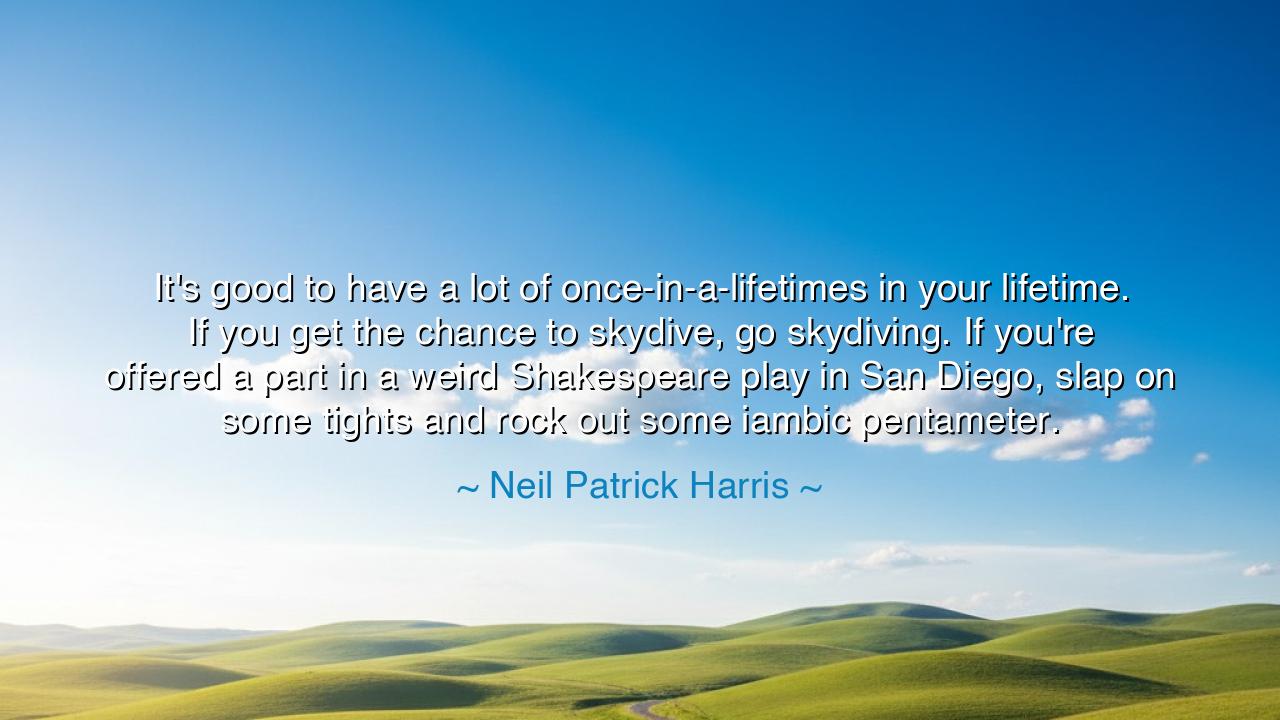
It's good to have a lot of once-in-a-lifetimes in your lifetime.
It's good to have a lot of once-in-a-lifetimes in your lifetime. If you get the chance to skydive, go skydiving. If you're offered a part in a weird Shakespeare play in San Diego, slap on some tights and rock out some iambic pentameter.






"It's good to have a lot of once-in-a-lifetimes in your lifetime. If you get the chance to skydive, go skydiving. If you're offered a part in a weird Shakespeare play in San Diego, slap on some tights and rock out some iambic pentameter." These words, spoken by the multi-talented Neil Patrick Harris, speak to the heart of a life well-lived—a life that embraces the adventure of opportunity, the joy of embracing the unexpected, and the courage to take on experiences that are rare and fleeting. Harris encourages us to not just go through life, but to seek out the extraordinary moments, the once-in-a-lifetime opportunities, that add richness and vibrancy to our journey. His words are an invitation to embrace life fully, to say "yes" to the adventures that come our way, and to seize the fleeting opportunities that might shape us forever.
The ancients understood the value of living boldly and seizing the moments that shaped one's destiny. Herodotus, the great Greek historian, once spoke of the Ionians and their love for experiencing the world—"To be a man is to make choices, to embrace those things that call you forth, and to honor those moments that push you to your limits." The ancients revered those who lived in pursuit of greatness and wonder, not simply those who held power. For them, the greatest heroes were often those who embraced the unexpected and stepped boldly into the unknown, knowing that their courage would lead to a fuller and more meaningful existence. To live a life of meaning was to embrace uncertainty and adventure, as they did when they sailed into the vast, untamed oceans or ventured into foreign lands, seeking not only knowledge but the experience of life itself.
In the same spirit, Alexander the Great—one of history's most legendary figures—was not content to rest upon the laurels of his birthright. His hunger for the extraordinary led him on an unprecedented campaign that carried him across continents, from Greece to India, conquering empires and encountering cultures that would shape his world forever. But it was not just the victories on the battlefield that defined his greatness; it was his willingness to embrace the unknown. He sought out new experiences, never content to simply live in the shadow of his father's conquests. Alexander’s life was a collection of once-in-a-lifetime opportunities—the decisions to go further, to learn more, and to embrace what others deemed impossible.
Similarly, the works of Shakespeare, with their rich layers of human complexity, emotional depth, and transformative roles, beckon to us with the same invitation Harris presents: embrace the opportunity, no matter how unconventional. The ancient Greeks, too, revered the power of theater and performance. In their theater, the gods and mortals collided in grand spectacles, and actors—often standing in simple robes—conveyed profound truths about the human condition. Sophocles, Euripides, and Aeschylus all used the stage to explore destiny, fate, and the complexities of identity. These performances were not merely for entertainment—they were an invitation for people to look inward, to question, to experience the very best and worst of what it meant to be human. Today, as Harris suggests, when an opportunity arises—whether in Shakespearean tights or adventurous skies—it is a chance to step into something larger than ourselves, to explore the depth of who we are, and to live boldly.
Harris’s words also serve as a reminder that life’s most impactful moments are often unpredictable and unplanned. The once-in-a-lifetime moments may come not when we are prepared, but when we least expect them. Leonardo da Vinci, often hailed as the quintessential Renaissance man, lived with a similar philosophy—seeking out not just knowledge, but the experiences that would allow him to flourish. His inventions, art, and scientific studies were not the result of careful planning alone, but rather the byproduct of a life that was always open to new opportunities. Da Vinci didn’t simply wait for the right moment to appear; he created his own moments, exploring uncharted waters in science and art, testing his limits with enthusiasm and curiosity.
The lesson that Harris imparts is clear: life is full of extraordinary opportunities, and it is only by embracing them, by saying yes to the unorthodox, that we can truly live a life of fulfillment. There is a wisdom in stepping into the unexpected, for it is in these moments that we discover the richness of our own potential and the vast possibilities of existence. Whether it is through adventure, like skydiving, or through stepping into a role that challenges us, like a Shakespearean play, we are called to push beyond the limits of our comfort zones and discover what we are truly capable of.
So, let us take this wisdom and live fully. When the opportunity arises to step into the unknown, to embrace the once-in-a-lifetime moment, we must not hesitate. Let us say yes to those moments that challenge us, that push us to grow, and that enrich the tapestry of our lives. Whether we are skydiving, acting, or simply choosing to venture down an unknown path, each moment of adventure is a chance to learn, to grow, and to live a life rich with experience. Let Harris’s words guide us: embrace the unexpected, for it is in these moments that life becomes truly extraordinary.






AAdministratorAdministrator
Welcome, honored guests. Please leave a comment, we will respond soon